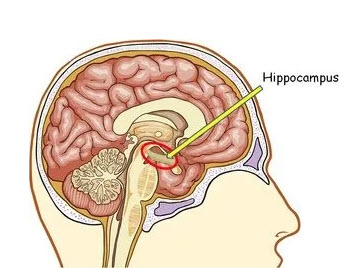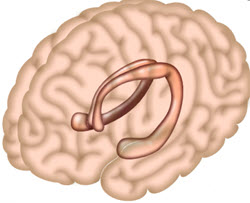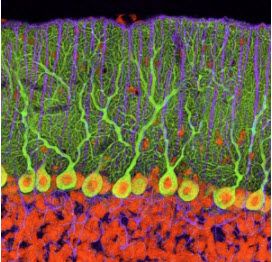A pair of thumb-sized structures deep in the center of the human brain are critical for our ability to learn and remember.
 Thanks to their shape, each of them is called hippocampus — which means seahorse in Greek. These brain areas have the unique capacity to generate new neurons every day. In fact, recent human studies have shown that there are 700 new brain cells in the hippocampus every day. Most of these neurons, however, do not survive. In their new-born (pre-mature) phase, they need a great deal of support to survive, grow, and become an active member of the hippocampal community of neurons.
Thanks to their shape, each of them is called hippocampus — which means seahorse in Greek. These brain areas have the unique capacity to generate new neurons every day. In fact, recent human studies have shown that there are 700 new brain cells in the hippocampus every day. Most of these neurons, however, do not survive. In their new-born (pre-mature) phase, they need a great deal of support to survive, grow, and become an active member of the hippocampal community of neurons.
Research shows that we have the capacity to grow new neurons above and beyond what is generally produced in our hippocampus and to make them become mature and strong within weeks and months.
The best way to generate new hippocampal neurons is to exercise.
In one study comparing brains of two groups of mice, the group that was assigned to running (lived in a cage with a running wheel in it) generated far more new neurons in their hippocampus than the group that was assigned to a regular cage without a running refill. Other studies have shown that people who exercise regularly and are physically fit have a much bigger hippocampus. The more you walk, the bigger your hippocampus will get and the less would be your risk for developing Alzheimer’s disease. One study showed that walking one mile a day lowers the risk of Alzheimer’s disease by 48%.
Recent research has also provided information about how the hippocampus can grow even without generating brand new neurons. The small premature neurons that are born every day have the capacity to grow taller, larger, and stronger by getting the right nutrition, plenty of oxygen, a molecule called BDNF (Brain Derived Neurotrophic Factor) and stimulation.
Some of the ways we can mature and nourish hippocampal neurons include eating a Mediterranean diet that includes olive oil, salmon and other food that are high in omega‑3 fatty acids, and nuts. Omega‑3 fatty acids are also available as DHA and EPA supplements. My recent research, published in Nature Reviews and referenced below, showed that higher blood levels of these important fatty acids, which are the building blocks of neurons, is associated with larger hippocampus size, better memory, and a much lower risk of developing Alzheimer’s disease.
The fascinating new neuroscience discoveries have provided compelling evidence on how other simple lifestyle interventions can also grow the hippocampus size. Stress reduction and meditation, for example, have been shown to substantially expand the volume of hippocampus. Treatment of sleep apnea, with using a CPAP machine, is another way you can grow your hippocampus.
Learning a new language or challenging one’s brain by learning new facts is yet another way to grow the very part of your brain that is critical for our ability to keep your memories alive for a lifetime and stay sharp as we get older.
Unfortunately, hippocampus can shrink as easily as it can grow.
Some of the ways to quickly shrivel it within months or years include stress, anxiety, untreated depression, obesity, uncontrolled diabetes, sedentary lifestyle, eating junk food, and concussions. Each of these negative risk factors have been associated with a smaller size hippocampus and a higher likelihood of developing Alzheimer’s disease in the future.
In summary, for the first time we have solid scientific evidence that we all have the capacity to grow the part of our brains that shrinks with aging and makes us prone to developing Alzheimer’s disease.
A bigger hippocampus can protect us against dementia symptoms in our 70s and 80s. These exciting new discoveries should empower all of us to be proactive in keeping our brain healthy today and to ward off Alzheimer’s disease decades later.
 A Harvard and Johns Hopkins-trained neurologist and neuroscientist, Dr. Majid Fotuhi is chairman of Memosyn Neurology Institute, Medical Director of NeuroGrow Brain Fitness Center, and Affiliate Staff at Johns Hopkins Howard County General Hospital. Reprinted from SharpBrains.
A Harvard and Johns Hopkins-trained neurologist and neuroscientist, Dr. Majid Fotuhi is chairman of Memosyn Neurology Institute, Medical Director of NeuroGrow Brain Fitness Center, and Affiliate Staff at Johns Hopkins Howard County General Hospital. Reprinted from SharpBrains.
What steps will you take to grow YOUR hippocampus? We’d love to know and share with our community!





I am 82 and still have a very good memory. I can picture memory items easily, such as the rubbish tags that weren’t delivered with my grocery order last week. I can picture my entire unpacking of $294.00 of groceries and cannot see the rubbish tags. I seem to have an instinct to challenge my brain. I have almost finished writing my life story, I watch informative programs on sky, and play solitaire on my computer each morning at breakfast. I hope my good memory continues. I also take Omega 3 capsules every day, and have done so for over 20 years.
What a wonderful example you are for all of us!
Challenging your brain on a daily basis is the secret we all need to know – that’s one of the ways to stimulate the growth of new neurons.
Doreen Humphries takes Omega 3 capsules daily for the last 20 years.
Do you think that those vitamins can prevent the shrinking of the hippocampus?
Naomi Bloch
Hello Naomi. There is evidence that Omega 3 (found in sardines, salmon and other fatty fish) is very beneficial for a whole range of conditions. We believe that getting these benefits from food is the best way but if the diet is lacking in natural sources, then supplements may be recommended by your doctor. Always check with your GP before spending lots of money!
HI GILLIAN. SO GOOD TO READ ABOUT HIPPOCAMPUS. I KNEW IT WAS IMPORTANT PART OF BRAIN BUT HOW TO IMPROVE IT IS WONDERFULL NEWS. BEINGING A VEGETARIAN I HAD TO FIND NATURAL WAYS TO PUT OMEGA 3 & 6 IN MY BODY. NOW I MAKE FRESH TABOuLI. WITH. MIXTURE NUTS,OLIVE OIL, HEMP SEEDS,& FLAX SEEDS FOR BREAKFAST. GREAT STUFF AND SO FILLING. FEEL GREAT EXERCISE ETC. STROKE HEART SURVIVOR AND NEARLY 79. LOVE YOUR EMAILS. DEBBIE